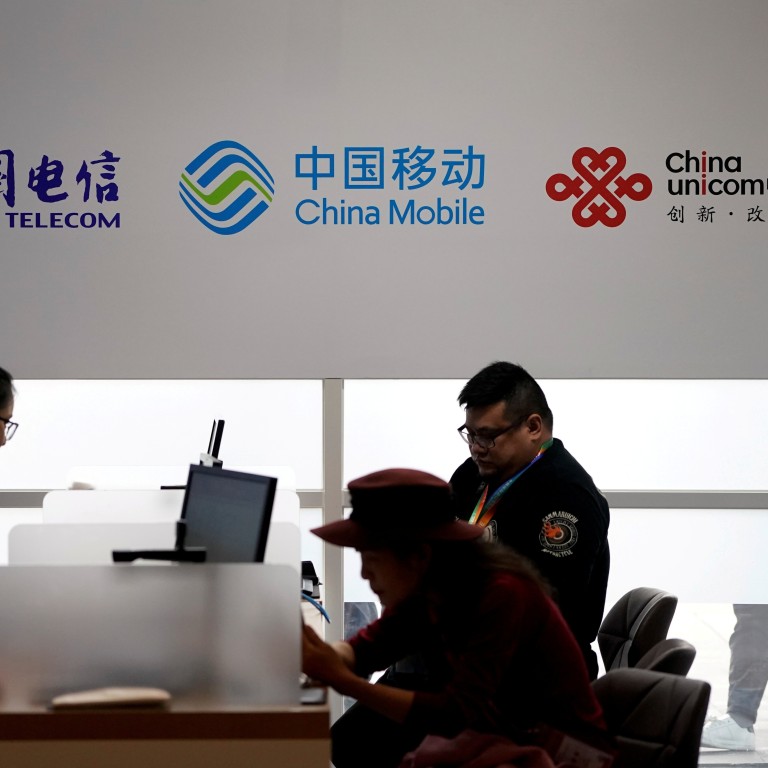
NYSE to make its second policy reversal in two days to delist Chinese telecoms stocks if US blacklist applies, source says
- Stock exchange intends to comply with executive order banning US investors from buying shares in firms deemed to have ties to the Chinese military, source says
- Order applies to China Mobile, China Telecom, China Unicom and more than 30 other companies and their subsidiaries
The New York Stock Exchange (NYSE) is committed to delisting three Chinese telecommunications companies if their subsidiaries are found to be affected by a US blacklist, according to a person with knowledge of the matter.
The NYSE intends to comply with President Donald Trump’s executive order that bans US investors from buying shares in companies the Defence Department says have ties to the Chinese military, said the person, who asked not to be identified because of the lack of authority to speak publicly on the issue.

Shares of the trio fell in Hong Kong after the NYSE’s second U-turn in two days. Unicom slid 0.4 per cent to HK$4.83, and China Mobile dropped 1.3 per cent to HK$45.50 while China Telecom rose 1.4 per cent to HK$2.19. The trio had surged a day earlier, adding HK$58.7 billion (US$7.56 billion) in value, after the NYSEs first delisting reversal.
A spokeswoman for the New York Stock Exchange declined to comment.
The whipsaw that the reversal caused has led investors to a reluctant conclusion that Washington, instead of market forces, has become the single largest driver when it comes to investing in Chinese companies.
“The confusion in markets reflects the internal turf battles within the administration over this issue,” said Michael Hirson of the Eurasia Group consultancy.
Coming just about two weeks before the US presidency will change hands, such inconsistencies have shown little signs of abating. The swift flip-flop has made these investments highly unpredictable and impossible to manage.
Trump’s executive order, signed on November 12, bans the purchase of shares in 35 Chinese companies and their subsidiaries with suspected links to the Chinese military.
New York exchange scraps plan to delist China’s telecoms stocks
As part of China hawks’ late efforts to get tough on Beijing before Trump’s term ends on January 20, a number of policies have been announced since Trump lost the election in November. The executive order was one example that was designed to have an outsize impact on the markets as it included the subsidiaries of the blacklisted companies.
“The executive order was pushed through by China hardliners without input from Treasury, which had fought such a move as disruptive to markets and the US financial sector,” said Hirson.
In late December, the Treasury Department, which wanted to be more cautious about the move, managed to water down some of the sweeping aspects of the order, clarifying in its own announcement that subsidiaries would only be included when explicitly named by the agency.
That quickly became an issue for China Mobile, China Telecom and China Unicom, which are on the blacklist, but only their subsidiaries are listed on the New York Stock Exchange. Treasury did not specify that these subsidiaries are included in the ban.
The New York Stock Exchange’s back-pedalling led to the outcry from at least one lawmaker. Senator Marco Rubio, Republican of Florida, called it “a[n] outrageous effort to undermine [Trump’s] Executive Order.”

Chris Iacovella, chief executive at the American Securities Association, criticised the NYSE’s decision and demanded “an explanation for this unthinkable reversal.”
Iacovella said Trump’s executive order and a recently passed bill to hold Chinese firms accountable of their audits violations “made it crystal clear to Wall Street: stop exploiting American investors to finance the Chinese Communist Party’s cyber army, its human rights abuses and its destruction of the environment.”
In a statement on Monday, the New York Stock Exchange said it “no longer intends to move forward with the delisting action”, citing further guidance from regulatory authorities in connection with the Office of Foreign Assets Control, a unit under Treasury.
Trump has a history of announcing inconsistent, sometimes contradictory, policies regarding China during his tenure. In most cases, they were seen as the result of an unpredictable leader his senior advisers at various agencies tried and failed to contain.
Yet the flip-flop on the decision to delist the three companies marked a worrisome development that many investors in the US feared they could be pushed by Washington to sell certain Chinese investments and incur unexpected and unnecessary losses.
In fact, major investment indices including MSCI, FTSE Russell, Bloomberg Barclays and JPMorgan have all removed a number of Chinese companies that Trump has blacklisted. Such removals have already dampened demand in these companies as passive investors such as mutual funds and exchange-traded funds (ETFs) are forced to sell the holdings to mirror the compositions of the indices.
S&P Dow Jones Indices said on Wednesday that it would not remove the ADSs of China Mobile, China Telecom and Unicom from its global benchmarks following the NYSE’s reversal on Tuesday.
Representatives at the Treasury, State and Defence departments did not respond to requests seeking comment for the story. China Telecom, China Mobile and China Unicom also did not comment.
It is unclear how the New York Stock Exchange came to the decision on December 31 to delist these three Chinese companies. Trump’s November executive order did not mention removing companies from the US stock exchanges.
This law addresses a separate and long-standing issue US financial regulators has had with China for refusing to hand over publicly traded companies’ audits for inspection. But companies would only be delisted unless they fail to become compliant with the law for three straight years.
With additional reporting by Chad Bray in Hong Kong.

